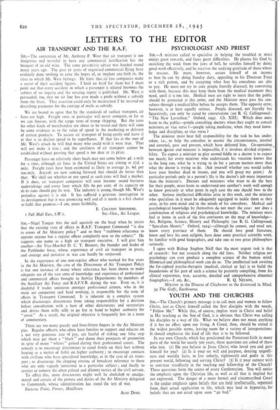PSYCHOLOGIST AND PRIEST SIR,—A minister called to specialise in helping
the troubled in mind enjoys great rewards, and faces great difficulties. He pleases his God by snatching the weak from the jaws of hell, he satisfies himself by doing good work effectively, and he receives the undying gratitude of those whom he rescues. He must, . however, assure himself of an income as best he can by doing Sunday duty, appealing to his Diocesan Fund or a rich patron, and by accepting what fees his consultees are able to pay. He must not try to cure people literally diseased, by conversing with them, because this may keep them from the medical treatment they need, until it is too late. Medical men are right to insist that the public should be protected at this point, and the Minister must pass his con- sultees through a medical filter before he accepts them. The opposite error, however, is at least equally serious. People diseased, not literally but figuratively, can only be cured by conversation (see R. G. Collingwood: " The New Leviathan." Oxford, 1942. Ch. XIII). Which does more harm to the public—people consulting doctors when they ought to consult ministers, or vice versa ?—people taking medicine, when they need know- ledge and discipline, or vice versa ?
The minister must bear full responsibility for the task he has under- taken, i.e., to help the consultee to master the circumstances, internal and external, past and present, which have defeated him. Co-operation between doctor and minister is impossible, if it involves divided responsi- bility. To expect a minister to play second fiddle to a doctor is to expect too much; for every minister who understands his vocation knows that in the long run, what he is trying to do for a person matters more than what the doctor is trying to do. (Ask yourself whether you would rather have your brother dead or insane, and you will grasp my point.) At particular periods only in a person's life is the doctor's job more important than the minister's. Doctors and ministers who want to do the best for their people, must learn to understand one another's work well enough to know precisely at what point in each case the one should bow to the other. Serious intellectual difficulties arise in this work, and the minister who specialises in it must be adequately equipped to tackle them as they arise, in his own mind and in the minds of his consultees. Medical and psychological knowledge by themselves do not meet the case: nor does a combination of religious and psychological knowledge. The minister must feel at home in each of the five continents on the map of knowledge— Art, Religion, Science, History and Philosophy (see R. G. Collingwood, " Speculum Mentis." Oxford, 1924)—although he cannot, and need not,
know every province of them. He should love good literature, know and love his own religion, have done some practical scientific work, be familiar with good biographies, and take one or two great philosophers seriously.
I -agree with Bishop Stephen Neill that the most urgent task is that of research: but not research along the old lines. Neither religion nor psychology can ever produce a complete science of the human mind. Historical and philosophical work can do so. The intellectual task awaiting the far-sighted psycho-therapist (medical, clerical or lay) is to build the foundations of his part of such a science by patiently compiling, from his clinical experience, true, accurate, detailed and comprehensive abnormal Minister in the Diocese of Chichester to the distressed in Mind. 34 The Golfs, Eastbourne.






























 Previous page
Previous page